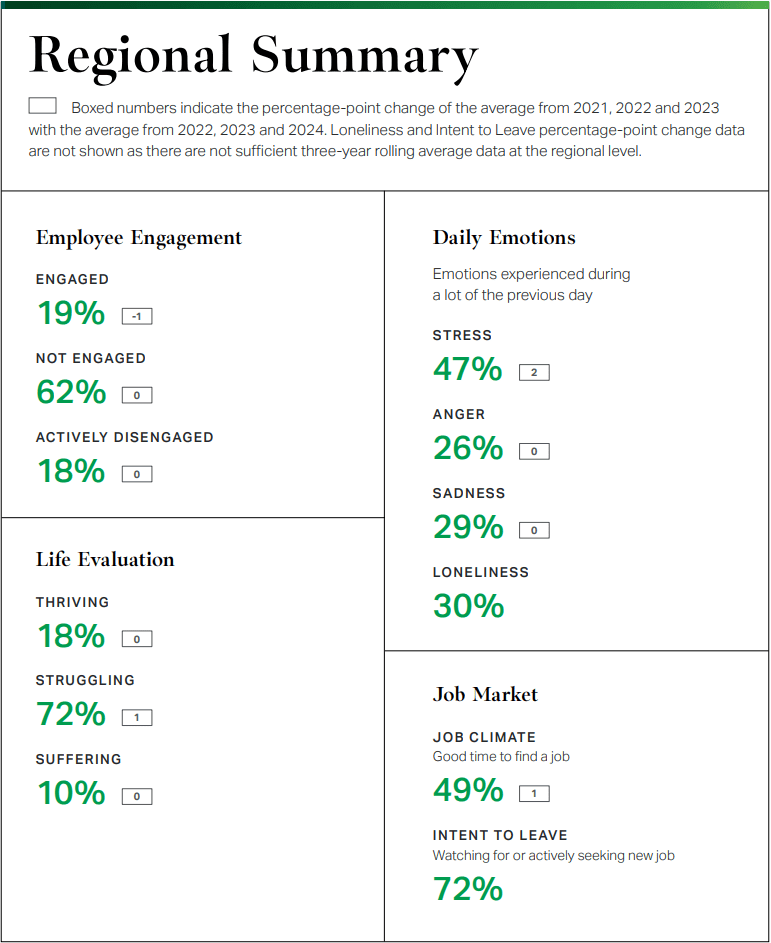- Workers in Sub-Saharan Africa are the most disengaged in the world according to a study conducted by Gallup.
- The majority of workers in the region report they are struggling emotionally and many say they are stressed.
- This has lead to workers seeking out other jobs, even in a climate where jobs are scarce.
Despite a VAT increase no longer happening, South Africans are still stressed and truthfully, a 0.5 percentage point increase in VAT was the least of our problems. Locals are constantly plagued by tales of corruption at a government level, shrinking buying power and the threat of the collapse of utility providers.
These concerns seep into every facet of our lives, especially at work given that this is where folks spend the majority of their day.
This was highlighted in Gallup’s latest report, the State of the Global Workplace: 2025.
The report highlights that in South Africa only 23 percent of employees feel engaged at work. While higher than the average on the continent, and the sub-Saharan Africa region, 23 percent is awfully low.
Gallup estimates that employee engagement falling, cost the global economy $438 billion in 2024 as this means employees were less productive.
“We are witnessing a pivotal moment in the global workplace — one where engagement is faltering at the exact time artificial intelligence is transforming every industry in its path. While few employees have harnessed AI’s full potential, its rapid advance will force every organization to adapt, whether they are ready or not. This presents a defining challenge for leaders and managers: Will they seize AI’s opportunities to energize their workforce, or will they risk falling behind?” asks Gallup’s chief executive officer, Jon Clifton.
The report reveals that workers and managers are feeling disconnected from their jobs and this couldn’t come at a worse time.
Drilling into the data for Sub-Saharan Africa, Gallup finds that the region has the highest percentage of employees feeling lonely on a daily basis. As many as 47 percent of employees in the region feel stressed, 72 percent are watching out for or actively seeking out a new job.
More concerning is that 72 percent of workers report that they feel as if they are struggling, far higher than the global average of 58 percent. To hammer that point home even more, folks are well aware that it’s not a good time to find a new job and yet, they are still looking.
Gallup offers some advice on how to turn the ship around but frankly, it’s all centred around making managers happier. The thinking here is that if managers are more engaged that will filter down to employees but we’re not so certain of that.

Looking at the summary above, employees in Sub-Saharan Africa aren’t just disengaged, they are unhappy and uplifting managers is only going to get you part of the way. The biggest number above is attributed to struggling, and yet, Gallup doesn’t mention the most obvious solution here – pay people more money.
Of course, employees aren’t going to be productive if they spend hours wondering how they are going to put food on the table or deal with being stressed over constantly mounting bills.
Standard Bank reported in October last year that only half of South Africans have more than R1 000 in their back account the day before they are paid. That means the other half don’t have more than R1 000 in their account at this time or are more likely broke.
While thank our stars that the VAT rate isn’t increasing, that is the least of our worries as a nation and as workers.
The fact of the matter is that the situation in the working world is tense. Workers are concerned that their jobs are at risk and that they will be replaced by AI before long. This is likely to intimidate workers and may dissuade them from bringing up the matter of a pay increase. It also doesn’t help that businesses claim to care about employees, only turn around and fire a load of contractors because they aren’t technically employees.
With that having been said, business owners also need to invest in their employees. All too often we hear about training initiatives launched by a business only for that to shutter less than a year later because, while a nice PR exercise, training is costly. Unfortunately though, eventually employees will leave if they feel they aren’t being cared for and that may cost a company more than training ever would.
Frankly, business owners and the C-Suite need to engage with employees and end this habit of treating them like anything other than humans. You’d be surprised just how much you can get from a person by treating them like a human and not another cog in a machine.

